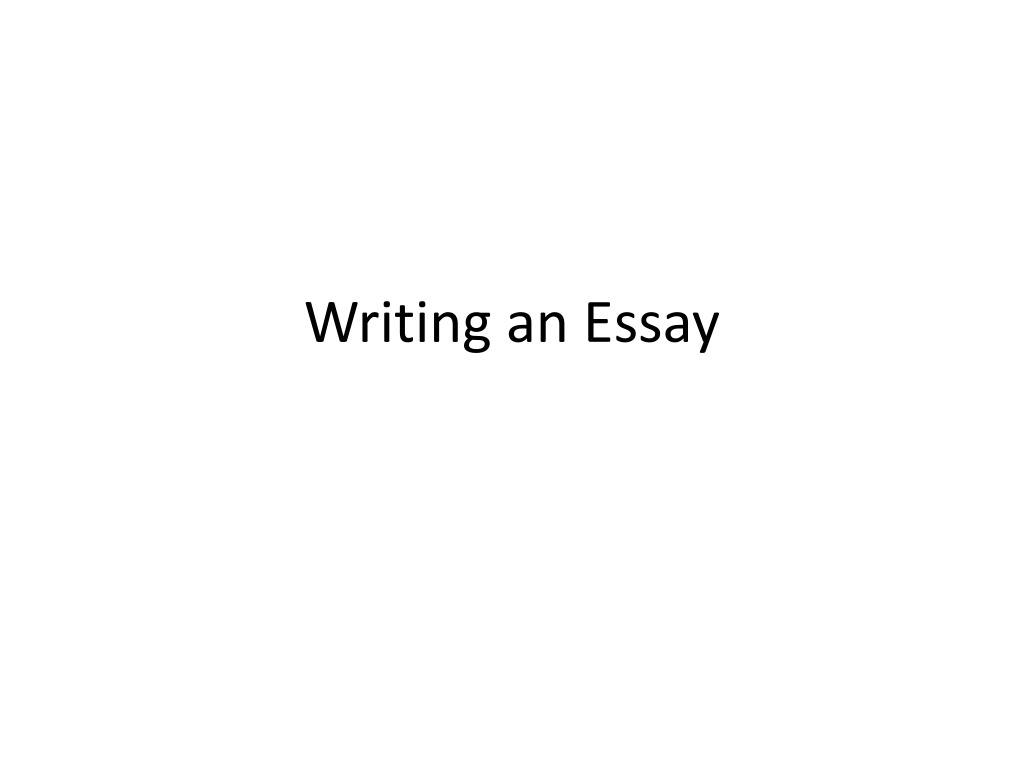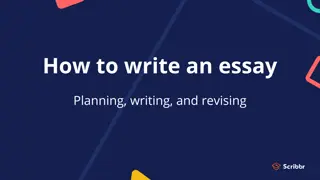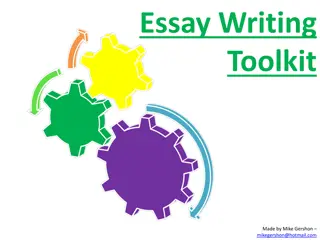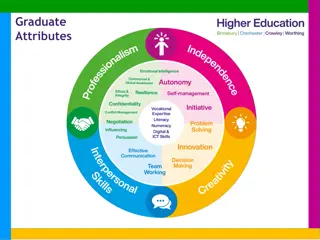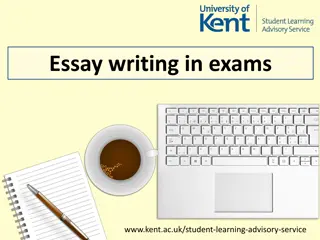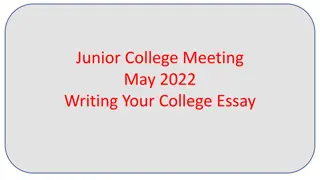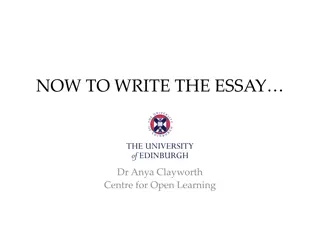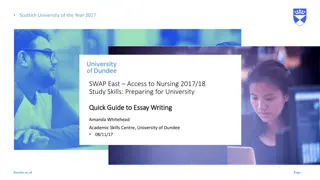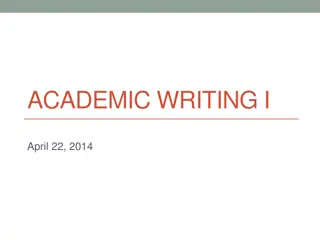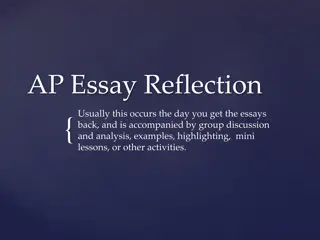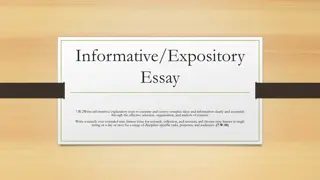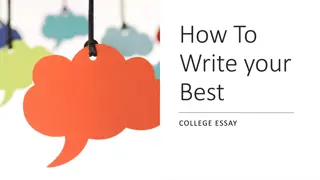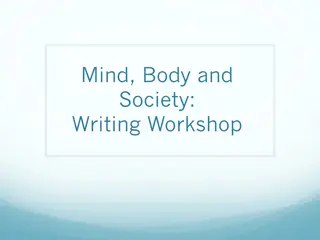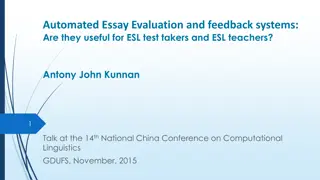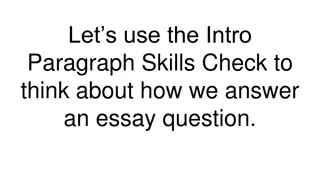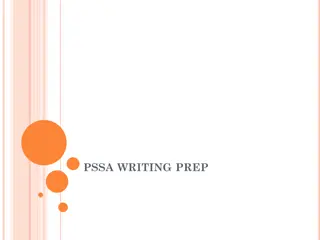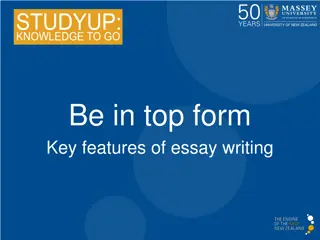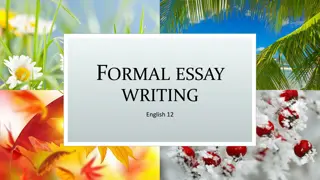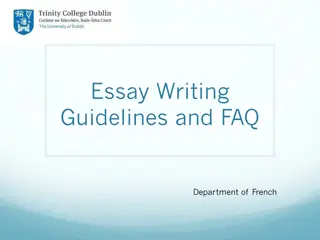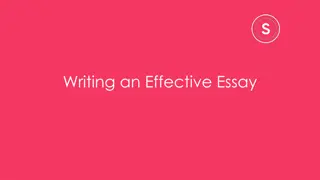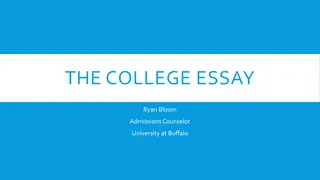Understanding the Purpose and Power of Essay Writing
Exploring the origins of the word "essay," this content delves into the essence of essay writing as an act of weighing thoughts and ideas rather than providing a final conclusion. It discusses the goals behind writing essays, highlighting the significance of intention and different orientations that drive individuals to engage in essay writing. Additionally, the content provides insights on overcoming boredom in essay writing and outlines essential elements that contribute to creating a good essay.
Download Presentation

Please find below an Image/Link to download the presentation.
The content on the website is provided AS IS for your information and personal use only. It may not be sold, licensed, or shared on other websites without obtaining consent from the author. Download presentation by click this link. If you encounter any issues during the download, it is possible that the publisher has removed the file from their server.
E N D
Presentation Transcript
1. What is an essay? Essai (middle French) attempt Exagium (Latin) act of weighing How do these words the origins of the word essay help us to understand what we re trying to do when we write an essay? An essay is not meant to be the last word on a particular topic. It s your thoughts on a particular question on a particular day no more than that
2. The power of Intention Why write an essay?
Goal orientation theory: what s the more powerful attitude to adopt? I want to get at least 16/20 This is really interesting. I d like to know more Performance goal orientation Learning goal orientation
Why write an essay? (Performance goal orientation) Because your teacher has asked you to Because your parents want you to do well Because you have to get your homework out of the way before you can do the things you really want to do Because you need a good mark on your bulletin
Why write an essay? (Learning goal orientation) Because you want to explore an idea in order to develop your understanding Because each time you write an essay you explore yourself, and develop your ability to think about things that matter Because you want to develop your ability to think critically, and to express your thoughts powerfully
What if you find essay-writing dull? If you re bored, you re not yet actually attempting or weighing something that you consider important. You need to engage with the subject at a deep enough level for it to matter to you Look deeper. Read more. Think about what you ve read; make notes on your thoughts. Find something in the essay question, and in the text, that gives you a way in and sets you thinking
What makes a good essay? a) Knowledge and understanding of the set texts, and relevant contexts (or reading of the Critical Appreciation passage) is secure, expressed in an informed personal response. b) Analysis is well developed, and alert to the possibilities of the question. c) Response to literary qualities of the texts is sustained and sensitive. d) Skills of writing, demonstration and close reading are evident to a high degree. (adapted from OIB marking criteria)
What is analysis? From the Greek analusis , a breaking up Breaking a topic (or text) selectively and systematically into parts in order to gain a greater understanding of it as a whole An attempt to answer the given question through two implied questions: what does this text mean? how does it create and convey its meaning?
Analysis must be alert to the possibilities of the question A question is an opportunity, not a threat Don t be passive and obedient: deconstruct the question, analyse it and interrogate so you can create an interesting (and truthful) argument
Planning Spend about 15 minutes planning and an hour writing. Leave 5 minutes for proof reading Highlight the key words in the question including the command words Think about their implications, both individually and in combination, in relation to the text Brainstorm ideas Write a thesis statement Bullet point an essay plan - the points you need to argue in your thesis statement Remember that you are not expected to write everything about the theme or topic, but to construct an argument
Introduction Engage directly with the question from the opening sentence Establish your position in relation to the question: your attitude and thesis statement/argument need to be clear from reading the introduction Be specific in introducing ideas that you will then develop in the body of the essay
Things to avoid Large amounts of contextual information: biographical or historical background, or explanations about a literary movement Restating or reformulating the question Making a list of literary techniques Using the first person, singular or plural (I or we) Personifying your essay - This essay will .
Main body paragraphs Begin each paragraph with a topic sentence - this is a sentence that introduces the main point of the paragraph within your argument Develop this point in more detail, exploring its implications Support each point with an example or quotation which you should then analyse End your paragraph with a concluding sentence.
Things to avoid in your paragraphs Retelling the story: keep it argumentative Using the first person (I or We) and One . Asking questions Sub paragraphs
Showing textual knowledge Quotations If you can t remember them exactly, get them as close as you can Make them work for you: use them to deepen your discussion of the point; analyse their significance Focused allusion Discuss an episode or moment in a novel or play, or language in a poem, in some detail without quoting
The literary dimension How does the question enable you to write about features of style, form, genre or voice? How do these features convey meaning? How can you explain this? What examples will you use, and what will you say about them?
Contexts Do the contexts underpinning the text socio- historical, literary, cultural, political help to illuminate the text? Make sure you use the contexts only to serve your argument and deepen your analysis
Writing, demonstration and close reading Writing: the language in English Language and Literature Demonstration: a thesis, developed through well-sign-posted paragraphs and demonstrated through reference to the text Close reading: demonstrated through reference to the text
Language (your own, not the writers) Use present tense Be direct and precise: choose your words carefully to say exactly what you mean Use appropriate technical terms. These make explanation easier and clearer, and save time but they aren t a substitute for explanation and argument Be succinct: make your writing dense enough to dig deeply in developing your points Keep your argument clear: help the reader. Use logical connectives to signpost the turns of your argument
Conclusion Return to the question, bringing together the main points you have given in your topic sentences in response Use these to give a fully resolved version of your thesis statement
Things to avoid in a conclusion Starting with phrases like in conclusion , to conclude , in a nutshell , summing up Using the first person (I or We) and One
Proof-reading Leave a few minutes at the end of each essay for proofreading Remember that everyone makes mistakes in the stress of the exam and even the best essays may have a few errors. However you need to avoid having so many errors that they impede the fluency of the writing
Draw a continuum line and indicate your level of confidence for each of the four strands: Knowledge Analysis; thesis in response to question Response to literary qualities of the text Writing, demonstration & close reading ______________________________________
